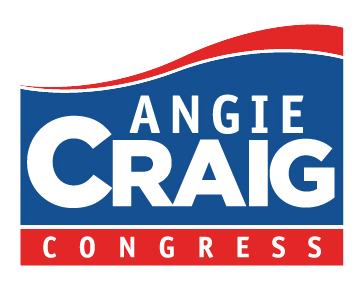For the sake of our veterans, we must eliminate the stigma around mental health care.
By: Angie Craig, Originally appearing in the Rochester Post Bulletin – Sept 10, 2021
As we observe this National Suicide Prevention Week, our country continues to face an epidemic of veteran suicides. Each of these deaths is preventable — and an unacceptable failure of our nation to provide the services and support necessary to care for those who put their lives on the line to defend our freedoms.
We all have a role to play in stopping these tragedies by working to erase the stigma surrounding mental health issues, being attentive to early warning signs and encouraging folks in our lives to seek out the help they need to get better.
Earlier this year, I held a roundtable discussion with more than a dozen Minnesotans to hear more about how veterans in our state are struggling to access the mental health care and suicide prevention resources they may need after returning from service. In our conversation, I heard from mental health experts, veterans, active-duty servicemembers and families who’ve lost loved ones to suicide — all of whom identified the stigma around mental health issues as one of the most consistent and insurmountable hurdles in our ongoing effort to save lives.
For too long, our society has maintained a perception that mental health issues are a weakness or a personal failing. This could not be farther from the truth — and yet tragically, this widespread and persistent stigma continues to prevent far too many of our nation’s veterans from seeking out the help they need.
This National Suicide Prevention Week, I want to use my voice to state clearly that reaching out for help is not only the right thing to do — it’s a lifesaving act of bravery.
Research from the Department of Veterans Affairs (VA) has shown that suicide rates decrease dramatically among veterans who are able to connect with mental health resources, especially if that treatment and counseling is available in their own community. It also demonstrates that too many veterans are either unaware or unwilling to seek out the resources available to them through the VA or other treatment options.
It’s clear to me that the federal government must do more to support our nation’s veterans when they return home from service. In recent years, we have taken extraordinary steps toward expanding access and raising awareness, including the Sgt. Ketchum Rural Veterans’ Mental Health Act, which I cosponsored and helped to enact earlier this summer. That bipartisan bill established new Rural Access Network for Growth Enhancement programs through the VA and has begun to support additional research on how we can address rural veteran mental health care needs.
But our work is far from over. We must continue working to pass and enact practical solutions like Commander John C. Hannon Mental Health and Suicide Prevention Act — which made a significant investment in veteran mental health resources, including funding to train more mental health professionals, expand access to telehealth programs and improve collaboration between the VA and community organizations across the country.
In Congress, I will continue to work with members of both parties to identify solutions that will address challenges many folks face in accessing high-quality, affordable care in their own communities. And in the meantime, I ask every Minnesotan to join me in supporting our nation’s veterans when they return from their service. We all owe a deep debt of gratitude to the brave men and women who serve our country — and it is the least we can do to be there for them when they return home. We must all do our part to ensure that no veteran or active duty servicemember is afraid to ask for help — and that these resources are readily available and accessible no matter where we live.
This week, please do your part — by reaching out to those in your life who may need help, and always making yourself available in a moment of need. And please remember, if you or a loved one are in need of help, please call the Veterans Crisis Line at 1-800-273-8255 and press 1, text 838255 or chat online at www.veteranscrisisline.net to reach caring, qualified responders with the Department of Veterans Affairs, many of whom are veterans themselves. This resource is free, confidential and available 24/7.
Angie Craig represents Minnesota’s 2nd Congressional District, which includes Goodhue and Wabasha counties. Her home is in Prior Lake.
